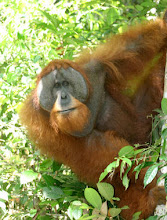On Monday evening our team in Sumatra received a report from a local farmer in Meka Makmur village, of an orphaned orangutan.
The story is conveyed by Putup (a RARE-OIC staff member); the farmer found the young orangutan in his durian tree. After hearing the orangutan crying, and searching for his mother, he decided that the orangutan was stressed as he had been "abandoned" by her. The farmer therefore climbed the durian tree, and gently teased the orphan to the ground. He then placed the orangutan in a small hut on his farmland before returning home for the evening.
The next morning the farmer returned to his hut bringing fruit and sweet tea for the orangutan. The orphan lived in this hut for a day or so until the farmer built him a small cage. One week later the farmer got in touch with Puput, telling him he had an orangutan and how he had come across it.
 |
It is important to remember that infant orangutans are highly dependant on their mothers for survival and development, they stay with her for at least five years in order to learn enough to survive in the forest. The care of such a young orphan needs to be conducted by a trained orangutan rescue centre.
In order to obtain an infant for the pet trade, the mothers are killed. It has been estimated that for every infant that survives the process of capture and transport, at least 3 others will have been lost, and each of these infants also represents the death of an adult female orangutan. We do not know what happened with this infant’s mother, if she was killed accidentally or on purpose. The one thing we do know is that she would have never voluntarily left her baby’s side, and she would have put up a fight if someone tried to take him away.
The young orphan is now in safe hands, in the care of the Sumatran Orangutan Conservation Programme (SOCP) at their rescue centre just outside Medan.
Here at the SOS, we are continuously fundraising in order to keep all our projects rolling. It is important to find more money for human orangutan conflict mitigation, as well as our ongoing conservation work.
There are many ways you can help fund our projects: become a member, make a donation, leave a legacy, or fundraise for us. You can see more photos from the rescue on our Facebook page.
Background information:
Organizational information:
The Human Orangutan Conservation Response Unit (HOCRU) is trained specifically to deal with situations where orangutan and human interests conflict. It is a collaboration between SOS, the Orangutan Information Centre (OIC), SOCP and the Government. HOCRU works closely with our OIC community conservation team, identifying current and potential problems and how best to solve them. All SOS projects in Sumatra operate trough the Orangutan Information Centre (OIC), and SOCP deals with all rescues and rehabilitations of orangutans in Sumatra.
Illegal trading:
In theory, orangutans are protected in Sumatra by legislation dating from 1931, which prohibits the owning, killing, or capture of orangutans. In practice, poachers still hunt them, mostly for the pet trade. In international law, orangutans are listed on Appendix I of the Convention on International Trade in Endangered Species (CITES), prohibiting unlicensed trade due to the conservation status of the species in the wild. However, there is a huge local, national, and international demand for infant orangutans to be kept as pets. The maximum penalty for keeping an orangutan captive is 5 years in jail and 100 million rupiah fine (approx £7,500).







No comments:
Post a Comment